
Blackhill and Consett community garden is leading the way in bringing people together and supporting the environment.
Community gardens often have a bigger impact than you might think. For many, they offer a safe, welcoming space to relax, connect with others, and support local wildlife and green spaces.
The garden at Blackhill and Consett Park is a brilliant example of how one small space can make a huge difference. Created around 15 years ago, it’s done more than just get people into gardening, it’s helped promote healthy eating and tackle physical and mental health issues too.
Blackhill and Consett Park Community Garden
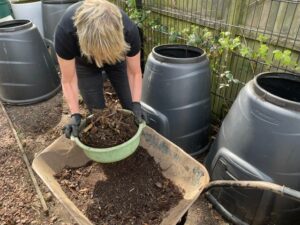
In April, the Derwent Valley Community Growing Network launched with an event at the garden. It gave the team the chance to shine and show how even small plots of land can bring big benefits, not just locally, but as inspiration to others starting their own food-growing projects.
Community health and wellbeing were at the heart of the garden’s creation. But it’s also about bringing people together. The space now offers a range of programmes and activities for adults and children, as well as informal learning opportunities. It’s also become a haven for biodiversity, with room to grow a wide variety of plants.
The garden is open to everyone and has become a peaceful place for individuals and groups to explore, learn, and connect.
For example, a local nursery uses the garden for outdoor play. An older men’s group also meets there to garden and build, and they’re now working on creating a brand new growing site nearby. Every Tuesday from 2023 to 2024, Kaydar Day Services, who support adults with learning disabilities, took part in weekly sessions. The garden has helped create lasting friendships and a real sense of community.
Before the pandemic, the garden even welcomed Syrian refugees, offering them a space to connect with locals and focus on something positive. Inspired by that success, there are now conversations about how to support Ukrainian families in the same way.
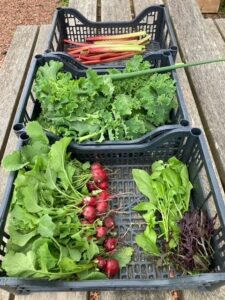
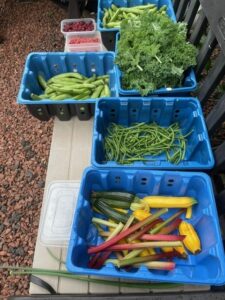 It’s not just a peaceful escape, it’s also practical. The garden regularly donates fresh vegetables to the community pantry, run by Derwentside Trust, and helps supply the Consett foodbank.
It’s not just a peaceful escape, it’s also practical. The garden regularly donates fresh vegetables to the community pantry, run by Derwentside Trust, and helps supply the Consett foodbank.
How it all started
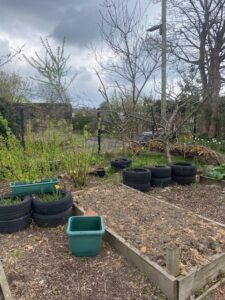 The project began as a health improvement initiative, supported by the Friends of Blackhill and Consett Park, along with what was then known as Leisureworks. Work began in 2010, transforming a derelict plot with the help of local schools and community members.
The project began as a health improvement initiative, supported by the Friends of Blackhill and Consett Park, along with what was then known as Leisureworks. Work began in 2010, transforming a derelict plot with the help of local schools and community members.
The idea was simple but powerful: support people’s physical and mental wellbeing and tackle isolation. One regular said, “The garden has allowed me to build friendships and keeps me fit.”
But the journey wasn’t always easy. Projects like this need a lot of time, effort, funding, and community support. Right from the start, the team engaged with local schools and held fundraisers – and even now, they continue to raise money to keep the space going.
Like many places, the garden had to close during Covid-19 (from March 2020 to July 2021), which made maintenance and fundraising difficult. But rather than lose hope, the team let nature take the lead, turning the space into a wildlife-friendly zone. Once it reopened, they received Covid Recovery funding to restart sessions, reconnect with families, and enjoy the many benefits of being outdoors once again.
Healthy Community, Healthy Environment
Green spaces like this are very important. They support good health and wellbeing, bring people together, and offer a chance to share skills and knowledge. Over the past 10 years, the Blackhill and Consett Park garden has become a valued part of the community. The adults from Kaydar even created a personalised journal to capture their favourite moments in the garden.
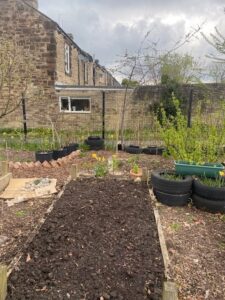
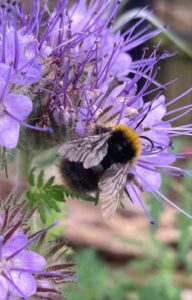 And of course, it’s a haven for nature too. What was once a derelict site is now a space where plants and wildlife can thrive. The team has taken great care to make it environmentally friendly, using approaches such as:
And of course, it’s a haven for nature too. What was once a derelict site is now a space where plants and wildlife can thrive. The team has taken great care to make it environmentally friendly, using approaches such as:
- No pesticides, herbicides, or chemicals
- Composting and mulching with natural materials like hops from a local brewery, cardboard, raw sheep’s wool, and ‘green manure’ (made from rye grass, clover, and herbs to enrich the soil)
- Wildlife features like hedgehog shelters, bird boxes, pollinator-friendly plants, and hand-built bug hotels
- New features including a “dead hedge” (a natural wildlife shelter), a bird bath, and a new pond in “plot 2” that will soon be filled with aquatic plants and developed into a wildlife space
The garden is now home to a range of species, including endangered solitary bees in the bug hotels, and Great Tits who have taken a liking to one particular bird box.
In October 2024, a beloved member of the group sadly passed away. Living in supported accommodation nearby, he was inspired by the garden’s impact and created a small green space of his own to bring joy to his neighbours – a beautiful legacy.
Inspiring Others
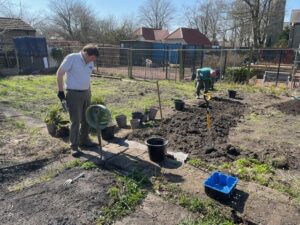 The team at Blackhill and Consett Park hopes their story encourages others to start their own projects. Here are some top tips they’ve shared:
The team at Blackhill and Consett Park hopes their story encourages others to start their own projects. Here are some top tips they’ve shared:
Build a community: Find like-minded people to share your vision. Working as a team helps shape ideas, secure funding, and get things done.
Choose your location wisely: Take time to research and plan your space. Make sure it’s accessible and right for the community.
Be prepared: It takes time, commitment, and hard work to create and run a garden. Think about your limitations. Will you need volunteers? How will you raise money? Are there grants available?
Vision for the Future
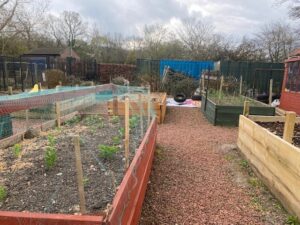
Looking ahead, the team plans to maintain and build on their success. They want to improve the space with structural updates like raised beds and complete the development of “plot 2”, including installing a large new shed, by the end of the year.
They also aim to keep growing their partnerships across County Durham to support biodiversity and make the garden even greener and more impactful.
Get Involved
The Blackhill and Consett Park Community Garden is open to all, whether you’re keen to get stuck in or just want to stop by and see what it’s all about.
New faces are always welcome. Sessions typically run on Tuesdays between 10am and 3pm, from March to October. The team of friendly volunteers and staff are on hand to answer questions and help you get involved.
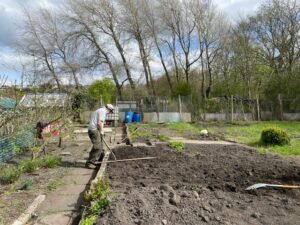 Those who’ve taken part have had great things to say. One regular shared, “The garden has helped me make roots in Consett.” Another said, “It’s improved my well-being, built confidence, and improved my joke repertoire! Great stuff!”
Those who’ve taken part have had great things to say. One regular shared, “The garden has helped me make roots in Consett.” Another said, “It’s improved my well-being, built confidence, and improved my joke repertoire! Great stuff!”
So, how will you take inspiration from their story? Will you visit the garden? Join a session? Or maybe even start your own community green space? However you choose to get involved, one thing’s for sure; creating healthier, happier communities is good for us all – and for the environment too.
We would love to hear from you
Share your stories, experiences, and photos of nature, and send us a few lines on how you are helping protect our environment in County Durham. Whether it is something you do personally, a community project you may be involved in, a business change or action, or even a great photo of nature. We want to celebrate and share your efforts and views.
Send us your stories or photos (with a short explanation) by emailing climatecountydurham@durham.gov.uk or by filling in our Get in Touch form and help inspire others across our beautiful county to take action. And do not forget to sign up to our Climate Change and Carbon Reduction Pledge.

